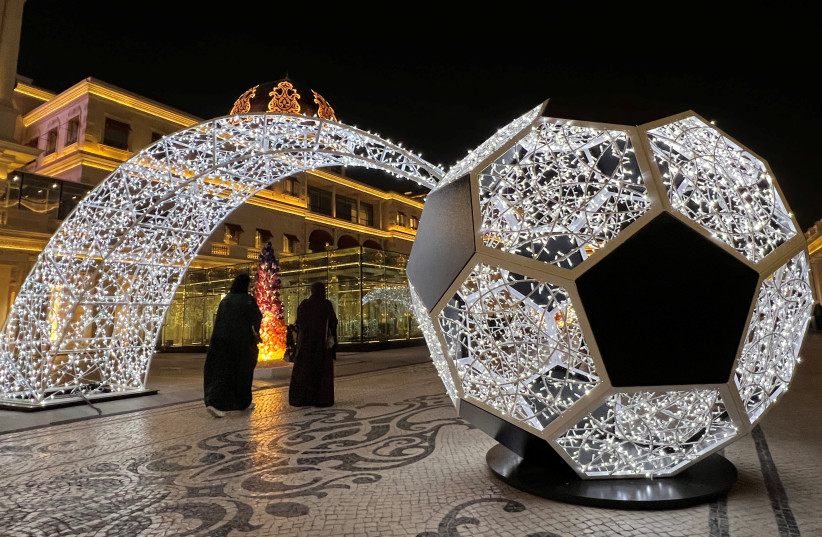Israel may not be one of the 32 nations playing in the World Cup beginning on Sunday, but it is certainly going to be one of the countries with the highest representations in Qatar.
Every four years, soccer fans from across the globe come together for a monthlong festival to celebrate the sport, as supporters of all colors and stripes make the FIFA World Cup the greatest spectacle on earth, and over 10,000 Israelis are expected to be a part of the action in Doha.
The Foreign Ministry released a guide for Israelis on Wednesday, instructing them on how to behave in Qatar.
The guide is part of the “Safe World Cup” campaign, which is introduced by a video that is narrated by Israel national soccer team captain Tal Ben-Haim.
“Drinking alcohol or using drugs is strictly forbidden,” he says in the video. “The prison sentences are long and the fines are high.”

The 40-second video does not cover all the rules and recommendations, but the campaign’s website has an extensive guide to how to behave in Qatar.
Israelis do not want to want to miss out, regardless of the fact that the blue-and-white haven’t been in the tournament since 1970, when it was held in Mexico.
Sabras from around the Holy Land have traveled in droves to locales such as Russia, Brazil, South Africa and Germany over the past 18 years to be a part of the celebration, and this year will be no different when the circus descends upon the Middle East and Qatar.
While Israel does not have diplomatic relations with the Persian Gulf state, Israelis will be permitted to enter the country and attend the games, as are citizens from every nation in the world, using special FIFA Fan ID Hay’ya Cards.
With Fan IDs, thousands of Israelis are expected to make their way to Qatar over the course of the competition, which begins on Sunday, November 20, and ends with the final game on December 18. A total of 64 matches will be played in eight stadiums in the country, with seven of them accessible by the state-of-the-art metro.
The World Cup begins with group stage play where the 32 teams compete within eight groups of four teams each, with each team playing the other teams in its group for a total of three games.
The top two teams from each group then move on to the round of 16 knockout stage, where a win means you advance to the quarterfinals, and a loss sends you back home. The one-game knockout goes all the way through to the final, where a champion will be crowned.
Who are Israelis flying to see play?
While Israelis who attend won’t be seeing their national team partake in the on-field action, many will be cheering for a country that may be near and dear to their hearts due to either heritage or just because they enjoy their style of play.
TO GET to the core of why so many Israelis will be taking time off – ranging from a few days for some and weeks for others, even for the entire tournament – The Jerusalem Post spoke to a number of Israelis who are about to embark on a journey unlike any other to Qatar and to perhaps the most unique World Cup in the history of the competition.
“Over the last 15 years, since 2008-09, there has been a huge shift in culture that has seen many Israelis travel to every type of sporting event abroad,” Daniel Shahak, who is making his second trip to the World Cup, explained.
“Prior to the COVID-19 pandemic, between 100,000 and 120,000 Israelis per year departed to see the UEFA Champions League matches, Real Madrid, basketball and the World Cup, but most headed to Spain to see Lionel Messi in Barcelona, which was roughly 70% of the sports travel market from the country.
“Israel is an expensive country, and people see that there is better football to be a part of in, say, a country like Spain, and it’s less expensive, so they go abroad.”
The number of Israelis going to the World Cup is enormous, Shahak continued. “At the 2014 World Cup in Brazil, Israel was the 11th largest ticket purchaser in the world and second among countries that didn’t have a team in the competition. Think about that. Israelis traveled around the world in huge numbers for this. In Russia at the 2018 World Cup, there were over 15,000 Israelis who traveled, because it was fairly close.”
Shahak attended four games in Russia, and will be taking in five contests in six days this time around in Qatar. He will stay with a friend in an apartment that was booked over a year ago.
The real thrill for the resident of Palmahim will be to see his beloved Argentina play Saudi Arabia. “I’ve been a fan of Argentina since I was very young, as my father’s family made aliyah from Rosario, where Messi and Angel Di Maria are from. I feel like I am at home when I am at their games.”

Shahak won’t be the only one traveling from Israel to see Argentina, as 30-year-old Sacha Vargas, who made aliyah from Argentina with his family when he was 10 years old, has saved up for this trip and will head to the World Cup.
“I have never seen Messi live in my entire life, and I am actually going to see him now,” said Vargas. “I felt a sense of urgency because this may be the last chance to see him play for Argentina.”
Vargas is super excited and counting off the days until he heads out to Qatar at the end of the month to see his Argentina play Poland. “I can’t describe in words how excited I am. I wanted to be able to do this my entire life, and one of the first memories I have as a sports fan was watching the Argentina National Team.
As one who grew up far from his homeland, an athlete like Messi was the connection to my Argentinian side. It’s really something amazing to think how crazy it will be as we walk to the stadium. I have been dreaming about the walk, how we will all be jumping up and down and singing before the game.”
The atmosphere is unrivaled, explained Hadar Segal from Tel Aviv, who has been to many sporting events throughout the world and will be making his second trip to the World Cup.
“After I was in Moscow and I saw how amazing the atmosphere and experience was, I had to go to Qatar; it was truly phenomenal. I am addicted to sports and have been at so many sporting events, from Maccabi Tel Aviv winning the Euroleague in Milan, to Barcelona and huge tournaments in Israel and abroad, but the World Cup is the biggest event in the world. I met so many people [there] from so many countries, and this one will be the same.”
Segal, an England supporter from the days of David Beckham and Michael Owen, will be going alone but will meet up with friends in Qatar. He made his arrangements to go just a couple of weeks ago through a local travel agent, and feels that the start of the tournament is the best, when the teams are still participating in the group stage.
“The group stages are the most fun because that is where all the fans are, and all of the stadiums are close together, which means everyone will be in a small area. The funny thing is that I never thought about the World Cup before Russia in 2018. I went because it was so close to Israel and not far away like the previous two in Brazil and South Africa. I was at three games there, and it was just incredible. There were so many fans from so many countries.”
Jerusalemite Michael Jankelowitz, who will be based in Doha for a little over a month, is slated to attend 21 games, and will also be celebrating his 70th birthday in Qatar on the opening day of the World Cup.
“My first World Cup was in 1998 in France,” he said, “and the last time was in Sochi, Russia, in 2018. This one in Qatar is not to be overlooked. Everything is in the radius of 65 miles [105 km.], and that is what makes it so special. At every other World Cup, you can’t maximize the trip at minimum cost, and that is what makes this unique. There are four games per day, and you can pick two to attend. So it’s a very manageable World Cup.”
A world traveler, Jankelowitz will be making his third trip to Qatar, and is a veteran compared to most Israelis, for whom this will be their first trip to the country. “Last year I was in Doha for the Arab Cup, and the first time was for the FIFA Club World Cup, and everything worked perfectly, so much so [that] the stadiums even have air-conditioning under the seats! They have invested billions to make this World Cup a success.”
Qatar will want to put on a show for the world; and for the fans who will be attending, the atmosphere is the No. 1 attraction, explained Jankelowitz.
“The atmosphere – there is nothing like seeing a sporting event live and in person. When you go to the stadium, you feel the vibe of the spectators, and, going to the World Cup, you get to see the best of international football. If one is able to, then go for it, no matter what the sport. Nothing beats being at the stadium and being part of the sensation.”
Shahak’s wife, a professional singer, songwriter and composer, will stay home, and had reservations about him going to a country that does not have diplomatic relations with Israel, but ultimately gave in to his love for sports, and even knows some of the Argentina songs as well.
“The tournament is not just going to the games,” he said. “It is also everything around the game – the signing, the dancing, talking to people about the games and with other people who may be around. The Fanzone is a place where everyone gets together, and you can be there all day just meeting people and watching football on the big screens. It’s an incredible experience.”
